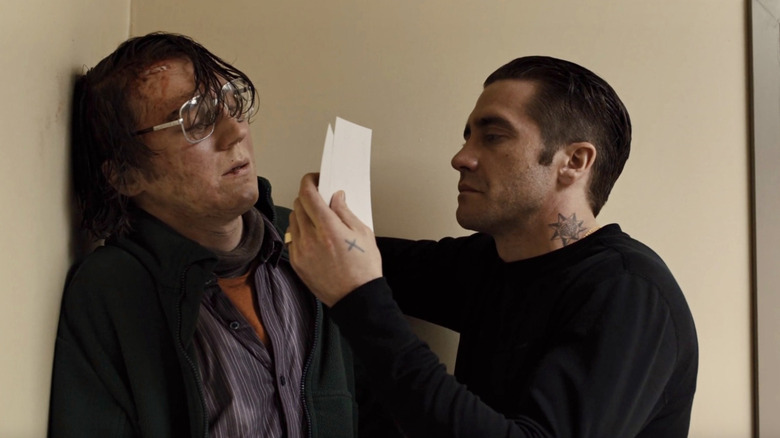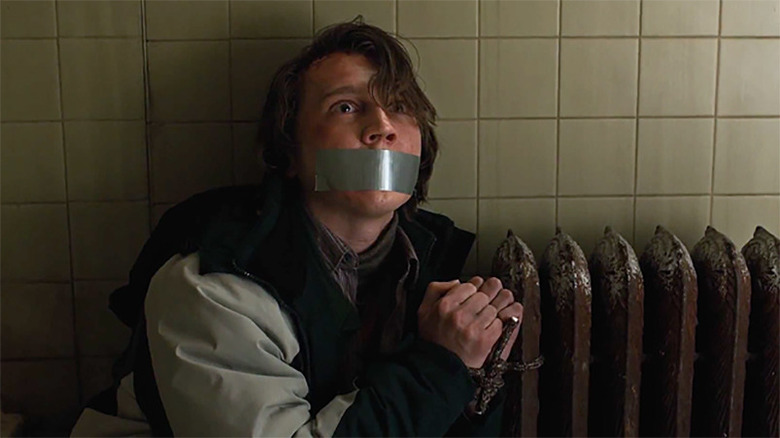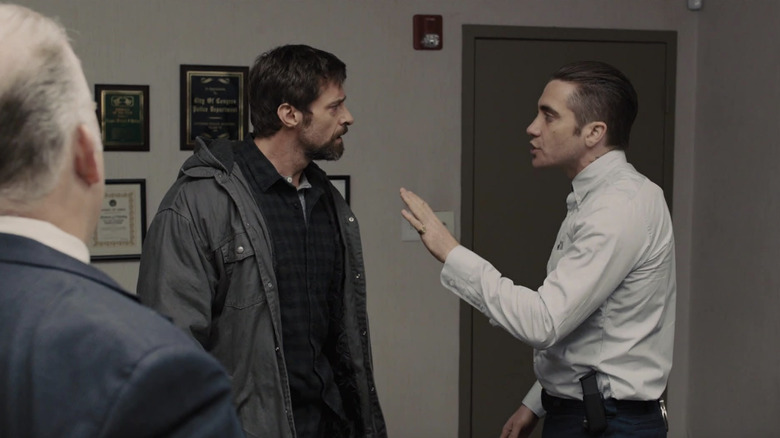Denis Villeneuve Had To Convince Paul Dano That Prisoners' Darkness Served A Purpose
Denis Villeneuve has always been a filmmaker who pushed boundaries in his storytelling. This can be seen in his earlier films like "Enemy," telling a story that transfigured feelings of lust and desire in dark and intense ways. The striking imagery accompanying Villeneuve's films matched the story's tone, creating an atmosphere that reels viewers in from the get-go. Such intensity in filmmaking continued to be evident in his big blockbuster productions like "Blade Runner 2049" and "Dune." Both epic sci-fi stories thrive off evocative imagery, constantly teetering on the darker and more ambiguous sides of their themes of humanity, power struggles, and violence.
One film of Villeneuve's that went darker than most of his previous work is 2013's thriller "Prisoners." The film is centered around the disappearance of a young girl and her father Keller's (Hugh Jackman) attempts to find his daughter and the abductor. In the middle of the struggle is Detective Loki (Jake Gyllenhaal), whose attempts to unravel the mystery have him going deeper down a rabbit hole of darkness and deceit.
Another character integral to the film is Alex Jones (Paul Dano), an intellectually disabled man who is the prime suspect in the kidnappings. Dano was hesitant about his role in the film, primarily due to the child abduction aspect of the story. Villeneuve would convince the actor to join the production, seeing the inherent darkness that comes with the subject matter as a necessary evil.
Finding meaning in the darkness
In an interview with Tribute Movies at the 2013 Toronto International Film Festival, Paul Dano spoke about his hesitancy to join the film, mainly because of his worry about using the serious subject matter as a cheap thrill:
"The initial reaction is, well, should one, does one want to go through this? And truthfully, I wasn't sure, because really it's about what kind of film the director wants to make and how he wants to treat the subject matter, and are we really going to explore what these people are going through, or is it just going to be used for sort of child abduction for a cheap thrill, which would not be of interest to me. So really it was about sitting down with Denis, the director, and sort of talking about the character and the film, and luckily he's a wonderful guy, and I think he had the right take on it."
The use of intense subject matters as cheap thrills is nothing new for Hollywood films, so the hesitancy is understandable. Thankfully, "Prisoners" would have Villeneuve and the rest of the crew handle the sensitive topics with grace while also not shying away from the intensity of the story. For example, Dano's character is revealed to be a victim of child abduction himself, in a cruel twist that makes the film's tone even drearier than it already is. The stark realities shown help ground the film in real consequences as opposed to the expected satisfaction of revenge in typical Hollywood thrillers like this.
Sensitive material in the right hands
Paul Dano also spoke in a separate interview about how lucky the cast and crew were to have a director like Villeneuve, who knows how to handle sensitive subject matters and the darkness that comes with them with a certain amount of respect. The actor said:
"I think this material, in the wrong hands, I don't think you want to go make a film about child abduction that you wouldn't respect seeing. And so I think it's a risk for us to go do this film, and what we're putting into the world. Luckily, we had a good group of actors and a really wonderful director who I felt, and we felt, that we could trust... we'll get to make a film that does the subject matter some justice in terms of treating it seriously, not just using it for thrills but actually exploring... what everybody would go through in this circumstance."
Villeneuve's exploration of authentic human emotions and reactions is part of what makes "Prisoners" such a dark film. There's no real hero to the story, just characters struggling to do the right thing. The cyclical nature of the violence in "Prisoners" leaves a resounding impact on viewers, making the film disturbing but essential viewing.


